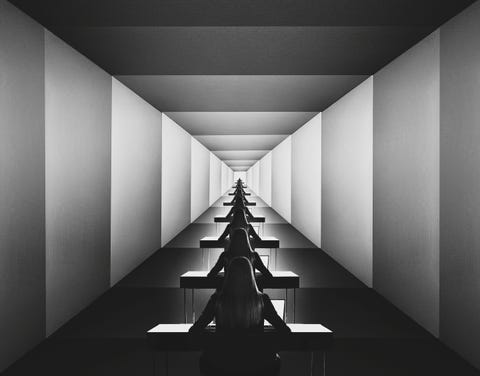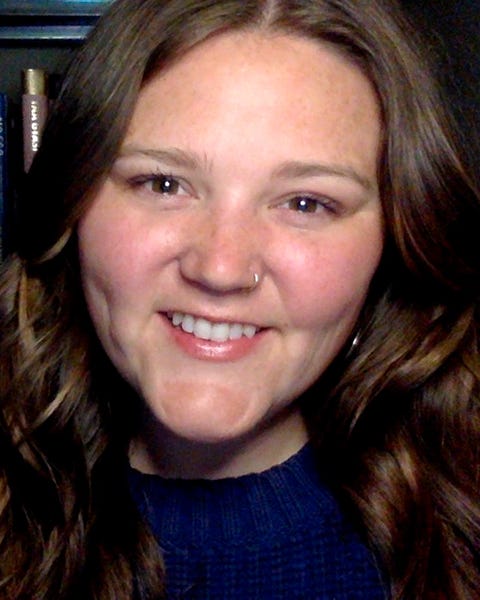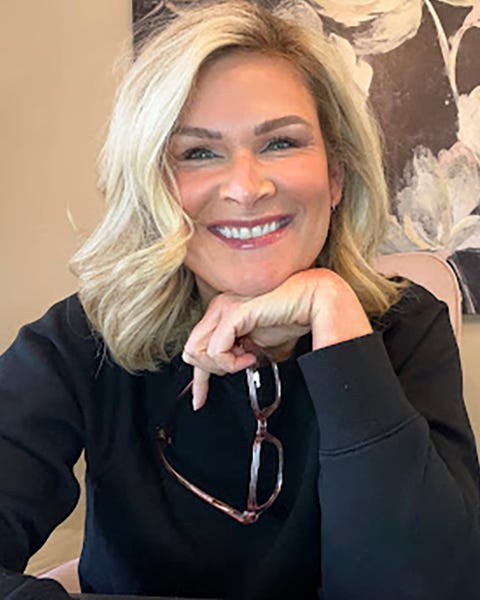Before she woke up drenched in sweat on the floor, Andrea thought the Zoom call was going great. What she remembers next are snippets of sensation: the coldness of the hardwood on her face as she willed herself to stand up, the nagging sense that she needed to get back to work. Never mind that it was past 3 a.m. or that she had, apparently, passed out in the middle of an eleventh-hour production meeting. As the 38-year-old account director for a major advertising agency, Andrea (who prefers not to share her last name) was used to the long days leading up to a major launch. Recent company turnover had only ramped up the pressure; for the past several months, she was effectively doing three people’s jobs. But as a single woman in the middle of a global pandemic, there wasn’t much else to do, anyway. Besides, she thrived on the adrenaline rush of an impossible challenge. Twenty-hour days and 90-hour weeks, unthinkable production windows for make-or-break campaigns—these were her moments to shine.
She eventually hauled herself back to the video call, still shaking, a bruise forming over her left eye. Her colleague later recalled that the scene—Andrea losing consciousness, closing her laptop as she fell—was “like something out of a horror movie.” Andrea remembers none of it. For two years, as COVID fortified the divide between parents and nonparents, women’s respective experiences have been framed in terms of work: emotional work, care work, career work. The image of the exhausted, overburdened mother has been emblazoned on the collective imagination. We saw it in the hard numbers—nearly 33 million Americans resigning from their jobs between April and November 2021, mostly women and extremely burned out. And we heard it in the “primal scream,” as a viral New York Times package called it, of mothers struggling to balance the demands of career and family in a time of virtual schooling, curtailed childcare, and not-so-secret disparities between men and women at home. The childless working woman, presumed frivolous by extension, her problems trivial by comparison, often quietly dissolved into her job. In the absence of contact with family and friends, the remote workplace became many white-collar workers’ stand-in for community. No doubt, work is work and, all told, parents had more of it. But career work, unlike parenting, does not offer love in return.
Andrea was one of more than a dozen high-achieving women without kids who generously shared their experiences for this story. In our phone conversations and email exchanges, they described internal and external pressures to assume ever-mounting responsibility, sometimes while caring for relatives or grieving a loss. Some recalled how their sudden, housebound isolation cut them off from the companionship and rituals that normally gave their lives meaning—not to mention work-life balance. And most spoke of the guilt and emotional baggage that comes from being a woman of child-rearing age who has opted, at least for now, to put career first.
Throughout the pandemic, childless women who were fortunate enough to keep their jobs, and who could do those jobs remotely, comprised a privileged minority within a privileged minority. Their struggles were different from those of working parents, but they were no less real. Among some high-achieving women, the elimination of boundaries between work and nonwork life became a recipe for disaster—and, from there, a catalyst for a major reevaluation of priorities and purpose.
Jordan Treadaway, 33, can’t help but laugh when describing her former career aspirations. “My dream job was always CEO,” she says. She came close, having worked her way up the corporate ranks to become the chief operating officer of a major hospitality company in Hilton Head Island, South Carolina. Then the pandemic hit.
“I was working from home and without kids, so there was kind of a combined assumption from my peers that I would always be available, because what else would I be doing?” Treadaway says. “But also, for myself, there was this kind of guilt. If I wasn’t always available, or if I would stop work to take a shower in the middle of the day, then I felt like I was taking advantage of the situation.” Treadaway dealt with the anxiety by working through it—literally. She worked upwards of 14 hours each day, taking breakfast, lunch, and dinner at her desk. She worked with partial pay through a furlough; when the furlough ended, she worked through every holiday. “I was constantly stressed,” she says. When she began to experience chronic headaches and intermittent panic attacks, she worked through those as well.
Women aren’t supposed to be workaholics. In American culture, it’s men who are often praised for going all-in on their jobs at the expense of their relationships and hobbies. It’s not actually good for them—one 2014 meta-analysis of 89 studies linked workaholism to lower levels of satisfaction in work, family, and life overall. But the high-profile successes of unapologetic workaholics, like Elon Musk and Jack Dorsey, ultimately frame these otherwise controversial figures as aspirational models of work-first fanaticism.
Women, on the other hand, are told from birth that motherhood is the most valuable potential vocation—the role to which they should be directing the bulk of their time and attention. Because of this, workaholism is more psychologically taxing for women than it is for men, even if their professional achievements are a point of pride, hypothesizes Malissa Clark, PhD, associate professor of psychology at the University of Georgia and coauthor of the 2014 meta-analysis. According to Clark, workaholic moms are likelier than their male counterparts to feel guilty for their compulsion to overwork. Workaholic non-moms, on the other hand, wrestle to pin down the value of their labor in a world that’s still very much structured around the nuclear family and home.
In other words, regardless of their parental status, all women suffer when they feel compelled to overwork. “There’s a discrepancy there, and that can cause a lot of stress and tension,” Clark says.
That discrepancy also elides the reality that women are disproportionately tasked with nonmaternal caregiving responsibilities, along with other assorted duties that get lumped under the umbrella of “emotional labor.” This work is essential, yet is rarely acknowledged, let alone accommodated, in the professional sphere.
Rochelle Ritchie, a 40-year-old in Chicago, assumed primary responsibility for coordinating her father’s care when he was hospitalized for COVID-19 in the spring of 2020, a role that fell to her as his oldest unmarried daughter. Working remotely in a senior communications role, Ritchie sometimes found her long workdays punctuated by back-to-back calls with her father’s critical-care team and work meetings. While colleagues with children were given some leeway to step away throughout the workday, Ritchie says she was expected to show up to every meeting and pick up the slack for others on her team. “I feel like people think, ‘Well, you’re single, you have no children. So you should be able to just take everything off,’ ” Ritchie says. “The thing about being single and with no children is that we are all we’ve got, at the end of the day.”
“Women are seen as a mother, as a mother, as a mother,” says Carrie Thornbrugh, a 37-year-old “child-free by choice” tech worker in Richmond, Virginia. Between caring for her mother, who has Alzheimer’s, long hours for her start-up job, and other adult responsibilities—a mortgage, a husband, pets—she says she is “always working,” yet feels guilty when she stops. “I don’t see a way out,” she says. “It’s a necessity, which makes me feel trapped.”
Like most human behavior, compulsive overwork can be learned. Several of the women I interviewed mentioned having had workaholic parents. Workaholics also tend to be type A perfectionists and achievement junkies—the sorts of people who thrive on external validation. They’re the person at the office who can solve the impossible problem, the one who can outwork everyone else without breaking a sweat. If the situation calls for someone to step up, they’ll step twice. And in a society where their personal life decisions remain widely perceived as unserious or self-indulgent, it stands to reason that they’ll overcompensate in other arenas. They’ll take more and more on, and they’ll get results.
In that sense, the pandemic played to the workaholic’s deepest vulnerabilities: an ache for approval, and to feel seen. It also brought new pressures in the form of remote teams, fear of layoffs, and heavier workloads as coworkers fell ill or became less available due to responsibilities at home. Clark says circumstances like these can definitely make workaholism worse. She adds that the blurred work-life boundaries brought on by working from home can exacerbate these tendencies even further, an observation that seems to be supported by 2020 Robert Half survey data. Among American professionals who transitioned to remote work in the pandemic, 70 percent reported working weekends and nearly half logged more than 8 hours a day.
Sonia Byun, 32, noticed the shift firsthand. She was already working 12- to 18-hour days as a management consultant in New York City when the pandemic began. Once the job went remote, however, she noticed that without in-office social cues to take breaks, she simply wouldn’t take them. “I wasn’t really sure when to eat, when to wake up, when to work out, all that stuff,” she says. She has since left the company, joined a new one, and also cofounded a women’s health start-up. But she still struggles to set limits on work. She’s been meaning to freeze her eggs, but can’t seem to find the time.
Whatever the circumstances, workaholism doesn’t just go away on its own. As with any addictive behavior, a person sometimes needs to recognize that they’ve hit the proverbial rock bottom before they’re inclined to make changes. “Maybe this”—the pandemic—“is their ‘aha’ moment,” Clark says.
For Arden McLaughlin, 43, the “aha” began last June, when she passed out in her living room after going for a run, and came to in a pool of her own vomit. She wound up being hospitalized for life-threatening dehydration and complications from heatstroke. Her bowels shut down; for two days, she had to wear an adult diaper. Her balance and peripheral vision remain impaired. “I literally could have died,” she says.
McLaughlin, who lives in Charlotte, North Carolina, admits that her health scare was the culmination of months of personal neglect. She wasn’t eating enough, and she wasn’t drinking water. The full force of her energy went into her PR and marketing business, which was floundering in the first year of the pandemic.
Alyza Berman, a psychotherapist based in Atlanta, says she’s seen an influx of new clients who have hit a similar wall. As a result, many are suddenly asking themselves what they really want out of life. “We live in a society that’s grade-driven, bank account–driven, social media–driven,” Berman says. “There are all these external influences, and nobody knows who they are anymore because [their motivations] are all externally driven.”
The women I talked to are fed up, no longer willing to go through the motions of what they think they should be achieving. They increasingly want to set their own terms for a life well-lived, haters be damned.
Ritchie, the communications director, cared for her father for more than five months until his death from COVID-19. She started a new job a month later—a mistake, she now realizes. Deep in grief, she wasn’t ready to be the best manager she could be; she says her new employer, meanwhile, wasn’t willing to offer her the consideration or psychological support she needed. Last summer, she quit.
Ritchie has since taken on an assortment of consulting projects and public-speaking gigs, including a lecture at a mental health conference for Black women shortly after she left her job. She spoke about letting go of “Superwoman syndrome,” the armor of indefatigability many Black women adopt in the face of white supremacy, to the detriment of their own mental health. These days, it’s a subject close to her heart. “It’s okay to take off the cape,” Ritchie says—a message for Black women in particular, but one that she thinks all women could stand to hear from time to time.
Treadaway, the former hospitality COO, says her wake-up call came last April. After months of unending work, she took one of her 45 accumulated PTO days to get married. When she turned on her phone that evening, only to be met by a flurry of frantic, work-related demands from her colleagues, she knew something had to give. She began seeing a therapist shortly thereafter, who diagnosed her with post-traumatic stress disorder as a result of her job. In June, she quit.
She now works as an office coordinator for an organic skin care start-up in Asheville, North Carolina. The role is much more junior, and the pay is 60 percent less than what she was earning at her last job, but it doesn’t feel like a step back. “I’ve never worked for somebody who is so understanding and progressive, and believes in the same things that I do,” she says.
Andrea, the advertising director, quit too: She gave her notice in the fall, shortly after passing out on the Zoom call, and she left the agency in January. She figures she’ll travel and recuperate for a few months, but her plans are open-ended. The time for decision-making isn’t now. “I think I just realized it’s okay to take a break,” she says.
This article appears in the March 2022 issue of ELLE.






